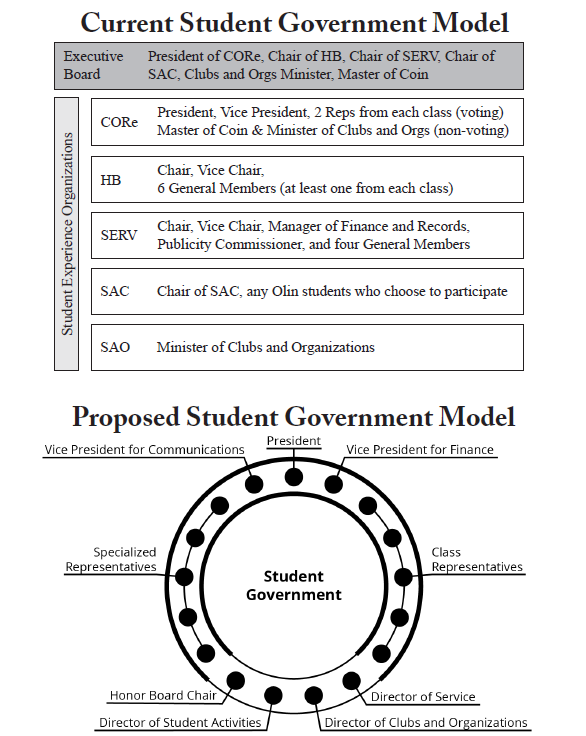Throughout my four years at Olin, I have had the privilege of participating in SERV as a general member, Honor Board as Chair, and CORe as Vice President. This means that I have also served on the Executive Board (E-Board) for two years. The E-Board is a little-known group that consists of the heads of SERV, SAC, SAO, HB, and CORe and that helps allocate the student activities fund and coordinate elections and other related activities.
In each of these positions, I have noticed things that could be changed for the better. Over time, each of the groups has done its best to tinker at the edges and make these changes where it could. For example, the election format has gotten progressively easier and more visible over time. Unfortunately, due to overly rigid charters for the organizations, this has also meant that we sometimes make changes we do not technically have the authority to make. Surprisingly enough, one of the more glaring omissions in the current CORe charter, established in 2010, is a total lack of a process for making amendments.
That’s why, starting last semester, CORe, in conjunction with the other student leadership groups, started contemplating the idea of rewriting everything from scratch. This process has produced a proposal for a new model of student government that we believe will be more flexible, streamlined, and cohesive.
The new model is summarized in the graphic at the bottom of the following page. The current model is also included for comparison. However, after months of discussions and planning, there are enough details to fill a few dozen Frankly Speaking articles (the entire proposal is twenty pages long). In this article I have chosen to include only a few of the most important details as follows:
• The E-Board has been eliminated, folding their role into the combined Student Government to help increase transparency. Since you probably didn’t even know the E-Board existed, you probably will not be bothered by its disappearance.
• SAC and SAO (renamed to Committee for Clubs and Organizations [CCO] in the proposal) have been expanded to help take some of the load off of these positions. SERV, on the other hand, has been condensed (read more about SERV’s change of structure in the following article “SERV Update and Restructuring”). The Honor Board will not change at all.
• In addition to the class representatives, five new representatives will meet directly with some of Olin’s administrative departments. These representatives will be liaisons to the Office of Student Affairs and Resources, Admissions, Marketing and Communications, Development, Family and Alumni Relations, the Collaboratory, the BOW Collaboration, Curriculum and Faculty, and Operations. This will serve to increase communication between faculty, staff, and students.
So, what will this new plan do for you? Honestly, in the short term, things will go on pretty much the same as they always have. The largest changes will be in how responsive the Student Government can be to new ideas. Hopefully, this new group can become a catalyst for communication amongst the entire Olin community.
At this point, we want to hear from you. We have collectively produced a document that outlines our intended changes in greater detail, along with the rationale behind each change, which will be sent out soon. Please, look it over and give us feedback. There will be a Town Hall meeting on Thursday, March 5th where we hope to put these changes to a vote.
Is there a change we missed? Did we change something you like? Let us know. There will be a variety of formal feedback sessions in the coming weeks – or you could just chat it up here in the dining hall. The student government might not really be broken, but we can make it better.
